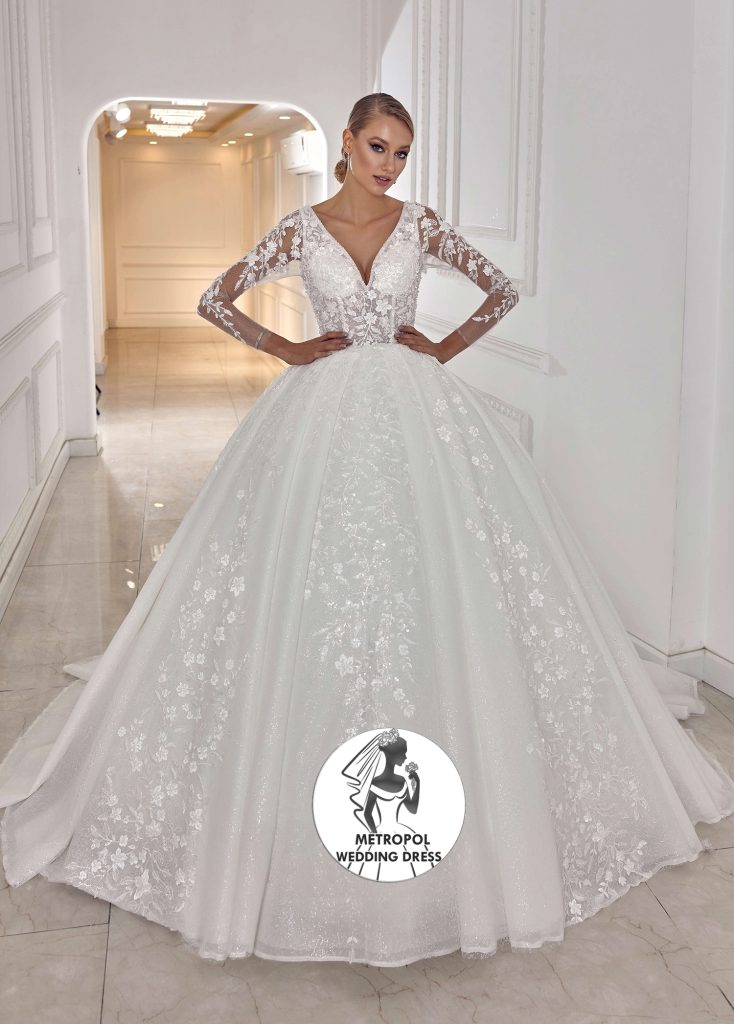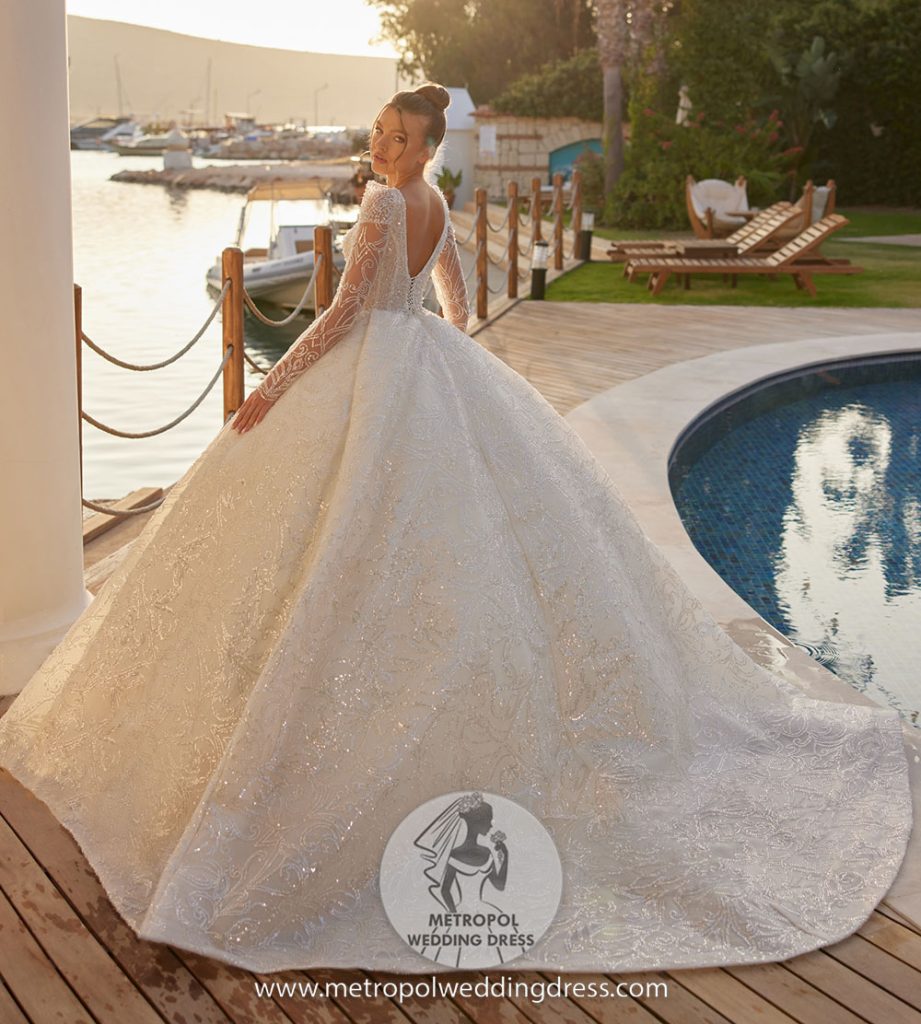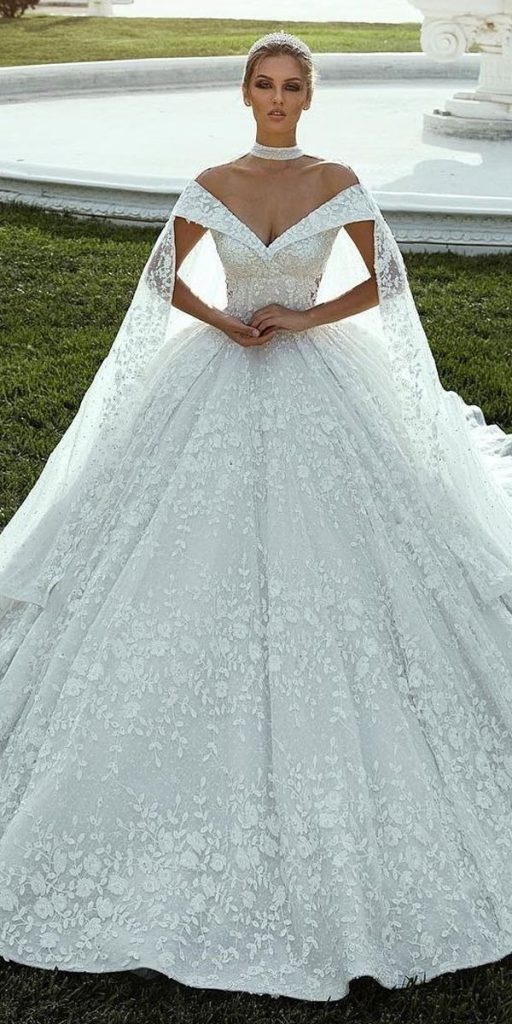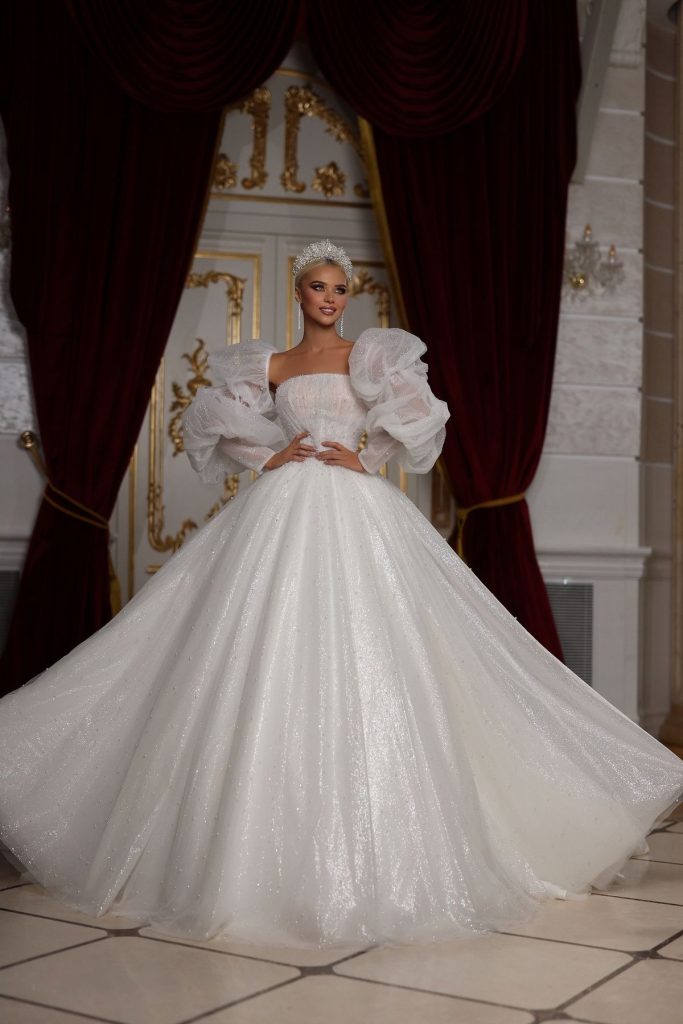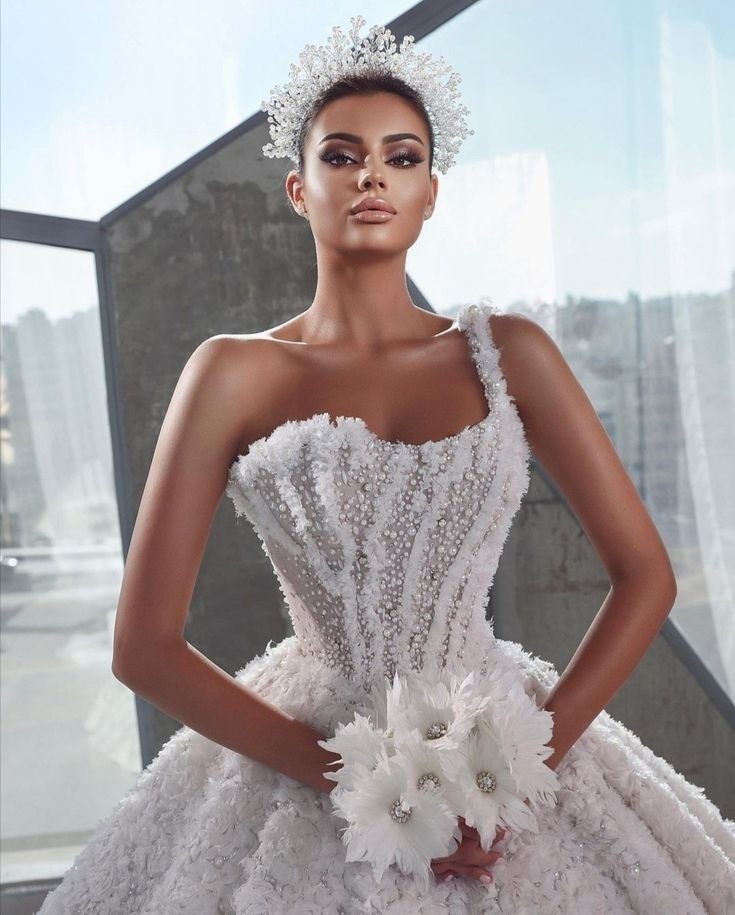
Customs Process for Turkish Bridal Gowns The allure of Turkish bridal gowns is undeniable, with their intricate designs, luxurious fabrics, and affordable elegance. Whether you’re a bride importing a custom-made gown or a retailer looking to bring these stunning dresses to your market, understanding the customs process for Turkish bridal gowns is essential for a smooth and cost-effective experience. This comprehensive guide covers everything you need to know about importing Turkish wedding dresses, including customs regulations, required documents, duties, taxes, and tips for navigating the process in 2025. Let’s dive into the world of Turkish bridal fashion and the customs journey that brings these gowns to you.
Why Import Turkish Bridal Gowns?
Turkish bridal gowns have gained global popularity due to their high quality, unique designs, and competitive pricing. Here are some reasons why they are a top choice for brides and businesses:
- Exquisite Craftsmanship: Turkish gowns are known for intricate embroidery, delicate lacework, and luxurious materials like silk, satin, and tulle, often adorned with traditional motifs like Rumi or Khatai.
- Affordable Luxury: Compared to European or American designers, Turkish gowns offer similar quality at a fraction of the cost, making them ideal for brides and retailers.
- Cultural Significance: These dresses often blend Ottoman, Middle Eastern, and modern influences, creating a unique aesthetic that appeals to diverse markets.
- Variety of Styles: From mermaid and ball gown silhouettes to dresses for veiled brides, Turkish designers cater to all tastes.
However, importing these gowns requires navigating the customs process for Turkish bridal gowns, which can be complex without proper guidance. This guide will walk you through each step to ensure a seamless import experience.
Understanding the Customs Process for Turkish Bridal Gowns
The customs process for Turkish bridal gowns involves complying with international trade regulations, preparing necessary documentation, and managing duties and taxes. Turkey’s strategic location between Europe and Asia makes it a hub for international trade, but its customs system has specific requirements that importers must understand.
Step 1: Research Turkish Customs Regulations
Turkey’s customs system is overseen by the Turkish Customs Administration, which enforces regulations for importing goods, including bridal gowns. Key considerations include:
- 2025 Regulations: Turkey has updated its customs rules for 2025, emphasizing digital documentation and e-commerce compliance. Importers must stay informed about these changes to avoid delays.
- Trade Agreements: Turkey has free trade agreements (FTAs) with countries like the EU, UK, and others, which may reduce or eliminate duties on bridal gowns. Check if your country qualifies for exemptions.
Step 2: Source Your Turkish Bridal Gowns
Before diving into the customs process, you’ll need to source your gowns. Options include:
- Visiting Turkey: Explore markets like Istanbul’s Grand Bazaar or Kadıköy for fabrics and designs, or work directly with designers like Ezra Tuba or Özlem Süer.
- Online Platforms: Contract with Turkish factories or designers through platforms like Tebadul or Etsy for custom orders. Ensure you hire a trusted customs agent for clearance.
- Local Ateliers: Istanbul’s neighborhoods like Nişantaşı and Fatih are home to skilled artisans who create bespoke gowns at competitive prices.
Step 3: Prepare Required Documentation
The customs process for Turkish bridal gowns requires specific documents to clear customs in your country. Missing or incorrect paperwork can lead to delays or penalties. Essential documents include:
- Commercial Invoice: Details the gown’s description, value, quantity, and supplier information.
- Packing List: Specifies the contents of the shipment, including weight, dimensions, and packaging details.
- Bill of Lading/Airway Bill: Proof of shipment for sea or air transport.
- Certificate of Origin: Verifies that the gowns are made in Turkey, which may qualify for duty exemptions under FTAs.
- Import License: Required in some countries for textile imports.
- HS Code: The Harmonized System (HS) code for wedding dresses (typically 6204.43 for women’s dresses) ensures accurate duty classification.
Work with a customs broker to ensure all documents are accurate and compliant with both Turkish and destination country regulations.
Step 4: Understand Duties and Taxes
Customs duties and taxes vary based on the gown’s value, your country’s regulations, and Turkey’s trade agreements. Key considerations include:
- Customs Duties: Rates depend on the HS code and your country’s tariff schedule. For example, the US imposes a 2.5–8% duty on wedding dresses, while EU countries may have lower rates under FTAs.
- Value-Added Tax (VAT): Many countries apply VAT (e.g., 20% in the UK) on imported gowns, calculated on the cost, insurance, and freight (CIF) value plus duties.
- Special Consumption Tax: Turkey may apply this tax to luxury goods, though bridal gowns are typically exempt. Confirm with your supplier.
To reduce costs, leverage duty exemptions under FTAs or use bonded warehousing to defer taxes until the gowns are sold.
Step 5: Choose a Shipping Method
Shipping options for Turkish bridal gowns include air, sea, or courier services like DHL or FedEx. Consider:
- Air Freight: Faster (3–7 days) but more expensive, ideal for urgent orders.
- Sea Freight: Cost-effective for bulk shipments but slower (2–6 weeks).
- Courier Services: Convenient for small orders or individual gowns, with built-in customs clearance support.
Ensure the gowns are packaged securely to prevent damage during transit.
Step 6: Navigate Customs Clearance
Once the gowns arrive in your country, they must clear customs. The process includes:
- Declaration Submission: Submit all documents to the customs authority. Use digital systems where available to streamline the process.
- Inspection: Customs may inspect the shipment to verify contents and value. Prepare for potential delays.
- Payment of Duties and Taxes: Pay any applicable fees to release the shipment.
- Clearance Channels: Turkey uses green (low-risk), yellow (document review), and red (physical inspection) channels. Accurate documentation reduces the likelihood of red-channel scrutiny.
Hiring a customs broker can simplify this process, especially for first-time importers.
Step 7: Address Common Challenges
Importers may face issues like:
- Classification Disputes: Incorrect HS codes can lead to higher duties. Verify codes with your broker.
- Valuation Disagreements: Customs may challenge the declared value. Provide detailed invoices to support your valuation.
- Delays: Seasonal congestion or incomplete paperwork can delay clearance. Plan ahead and submit documents early.
Tips for a Smooth Customs Process
- Work with a Customs Broker: A professional can handle documentation and compliance, saving time and reducing errors.
- Use Digital Tools: Turkey’s 2025 e-commerce customs overhaul emphasizes digital submissions. Use platforms like Turkey’s e-Devlet for streamlined processing.
- Plan for Costs: Calculate landed costs (CIF value + duties + taxes) to avoid surprises.
- Build Relationships: Establish ties with reliable suppliers and customs agents for long-term success.
Conclusion
The customs process for Turkish bridal gowns can be complex, but with the right preparation, it’s a manageable and rewarding endeavor. By understanding regulations, preparing accurate documentation, and leveraging trade agreements, you can import stunning Turkish gowns efficiently and cost-effectively. Whether you’re a bride seeking a custom masterpiece or a retailer expanding your inventory, this guide equips you with the knowledge to navigate the customs landscape with confidence. Start your journey today and bring the elegance of Turkish bridal fashion to your doorstep.
When planning a wedding, the dress and cultural traditions play a central role in creating a memorable day. For brides drawn to the rich heritage of Turkey or those importing a gown, understanding traditional Turkish wedding dresses, the customs process for Turkish bridal gowns, and how to travel with a dress are essential. This comprehensive guide answers key questions like What is a traditional Turkish wedding dress?, How long does it take for a custom wedding dress to be made?, How does a Turkish wedding work?, and practical travel concerns such as Can I bring a wedding dress on a plane? and How to fly with a formal gown?. We’ll also explore the most flattering wedding dress, the most expensive wedding dress in the world, and which country has the most beautiful wedding culture. Let’s dive into the enchanting world of Turkish bridal fashion and traditions.
What is a Traditional Turkish Wedding Dress?
A traditional Turkish wedding dress is a stunning blend of historical influences, modern elegance, and cultural motifs. Rooted in Turkey’s Ottoman heritage and diverse regional traditions, these gowns are known for their intricate designs and luxurious materials.
Characteristics of Traditional Turkish Wedding Dresses
- Fabrics: Common materials include silk, satin, velvet, and tulle, often adorned with gold or silver embroidery.
- Embellishments: Intricate details like zari (gold thread) embroidery, pearl inlays, and lacework reflect Ottoman artistry.
- Styles: Traditional dresses range from the bindallı (a heavily embroidered velvet gown) to modern interpretations with flowing trains or fitted bodices.
- Colors: While white is popular for modern Turkish brides, traditional dresses often feature rich colors like red, burgundy, or gold, symbolizing prosperity and joy.
- Cultural Motifs: Designs may incorporate Rumi patterns, tulip motifs, or calligraphy inspired by Turkish art.
Regional Variations
Turkey’s diverse regions offer unique bridal styles:
- Istanbul: Modern, elegant gowns with a fusion of Western and Ottoman influences.
- Anatolia: Embroidered kaftans or bindallı dresses with vibrant colors.
- Aegean Region: Lighter, flowing gowns with delicate lace and floral accents.
Brides seeking a traditional Turkish wedding dress can work with designers in Istanbul’s Nişantaşı or Fatih districts or source gowns online from platforms like Lunss Couture.
How Long Does It Take for a Custom Wedding Dress to Be Made?
Creating a custom wedding dress is a meticulous process that requires time and collaboration. In Turkey, known for its skilled artisans, the timeline depends on several factors:
- Designer’s Schedule: High-end designers like Ezra Tuba or Özlem Süer may require 4–8 months due to demand.
- Complexity of Design: Simple gowns take 2–3 months, while intricate dresses with hand-stitched embroidery or beadwork can take 6–12 months.
- Fittings: Multiple fittings (2–4) are needed to ensure a perfect fit, adding to the timeline.
- Shipping: For international brides, add 1–4 weeks for delivery.
Tips to Plan Ahead
- Start 6–12 months before your wedding to avoid rush fees.
- Schedule consultations early, especially during peak wedding seasons (spring and summer).
- Communicate your timeline clearly with the designer to prioritize your order.
How Does a Turkish Wedding Work?
A Turkish wedding is a vibrant celebration steeped in tradition, blending ancient customs with modern elements. Understanding how a Turkish wedding works provides insight into the cultural significance of the bridal gown.
Key Stages of a Turkish Wedding
- Engagement (Söz Kesme): A formal ceremony where families exchange rings and gifts. The bride may wear a simple traditional dress or kaftan.
- Henna Night (Kına Gecesi): A pre-wedding ritual where the bride wears a red or burgundy bindallı gown, and henna is applied to her hands for good luck.
- Wedding Ceremony: Modern Turkish weddings often include a civil ceremony followed by a reception. The bride typically wears a white gown for the ceremony and may change into a traditional dress for dancing.
- Post-Wedding Rituals: Some families perform traditions like the bride stepping on the groom’s foot to symbolize dominance or scattering coins for prosperity.
Role of the Dress
The traditional Turkish wedding dress shines during the henna night and reception, with brides often choosing multiple outfits to reflect different stages of the celebration.
Can I Bring a Wedding Dress on a Plane?
Traveling with a wedding dress can be stressful, but with proper planning, you can bring a wedding dress on a plane safely. Whether it’s a traditional Turkish wedding dress or a modern gown, airlines have specific policies to accommodate formal attire.
Airline Policies
- Carry-On Allowance: Most airlines allow wedding dresses as hand luggage, provided they fit within carry-on size restrictions (typically 22 x 14 x 9 inches, including handles and wheels).
- Garment Bags: Use a breathable garment bag to protect the dress. Some airlines allow garment bags as a carry-on item.
- Priority Boarding: Request priority boarding to secure overhead bin space for your dress.
Tips for Flying with a Wedding Dress
- Contact the Airline: Confirm policies with airlines like Turkish Airlines or Delta before booking.
- Pack Light: Minimize other carry-on items to prioritize the dress.
- Protect the Dress: Use tissue paper and padding to prevent creasing, and avoid checking the dress in luggage.
How to Fly with a Formal Gown?
Flying with a formal gown, such as a traditional Turkish wedding dress, requires careful planning to ensure it arrives in pristine condition. Here’s how to fly with a formal gown:
- Choose a Sturdy Garment Bag: Opt for a padded, breathable bag with a hanger loop for easy carrying.
- Fold Strategically: If the dress must be folded, place tissue paper between layers to prevent wrinkles.
- Request Cabin Storage: Ask flight attendants to hang the dress in a cabin closet, often available on long-haul flights.
- Steam Upon Arrival: Bring a portable steamer or arrange for professional steaming at your destination.
Can You Take a Wedding Dress as Hand Luggage?
Yes, you can take a wedding dress as hand luggage, but there are considerations to keep in mind:
- Size Restrictions: Ensure the dress fits within the airline’s carry-on limits. Foldable garment bags can help.
- Security Screening: Be prepared for additional screening, as garment bags may require manual inspection.
- International Flights: For Turkish gowns, check customs regulations for importing textiles to avoid delays.
What is the Most Flattering Wedding Dress?
Choosing the most flattering wedding dress depends on your body type, style preferences, and comfort. Turkish designers offer a range of silhouettes to suit every bride:
- A-Line: Flattering for most body types, with a fitted bodice and flared skirt.
- Mermaid: Accentuates curves, ideal for hourglass figures.
- Ball Gown: Perfect for creating a dramatic, princess-like look.
- Sheath: Sleek and elegant, great for petite or slender frames.
Tips for Choosing a Flattering Dress
- Work with a Turkish designer to customize the gown to your proportions.
- Opt for fabrics like satin or lace to enhance your silhouette.
- Consider cultural elements, such as Ottoman embroidery, for a unique touch.
Which is the Most Expensive Wedding Dress in the World?
As of 2025, the most expensive wedding dress in the world is the Diamond Wedding Gown by Angelababy, valued at $31 million. Designed by Dior, it features 100 carats of diamonds and took five months to create. While not Turkish, this gown highlights the global appeal of luxurious bridal fashion, which Turkish designers like Arzu Kaprol emulate at more accessible price points.
Which Country Has the Most Beautiful Wedding Culture?
Determining which country has the most beautiful wedding culture is subjective, but Turkey stands out for its vibrant traditions, colorful rituals, and stunning bridal attire. The blend of Ottoman heritage, regional diversity, and modern elegance makes Turkish weddings a feast for the senses. From the henna night to the intricate traditional Turkish wedding dress, Turkey’s wedding culture is both timeless and enchanting.
Other Notable Wedding Cultures
- India: Known for vibrant saris, multi-day celebrations, and intricate rituals.
- Italy: Romantic ceremonies with elegant gowns and scenic venues.
- Japan: Combines Shinto traditions with modern kimonos and minimalist aesthetics.
Conclusion
From the elegance of a traditional Turkish wedding dress to the practicalities of the customs process for Turkish bridal gowns, this guide covers every aspect of bringing Turkish bridal fashion into your wedding. Whether you’re curious about how a Turkish wedding works, how to fly with a formal gown, or finding the most flattering wedding dress, Turkey offers a wealth of inspiration and expertise. Start your journey today by exploring Turkish designers, planning your customs process, and ensuring your gown travels safely to make your wedding day unforgettable.
Turkish bridal fashion is renowned for its blend of cultural heritage, modern elegance, and affordability, making it a top choice for brides and grooms worldwide. This comprehensive guide explores Turkish wedding dresses with hijab, Turkish wedding dress male attire, and leading bridal brands like Amarya Bridal and House of Zarif Bridal. Whether you’re searching for a modest gown, a stylish groom’s outfit, or the best bridal shop in Turkey, this article covers everything you need to know about bridal fashion in Turkey. From design inspiration to shopping tips, let’s dive into the vibrant world of Turkish wedding attire.
Turkish Wedding Dress with Hijab: Elegance Meets Modesty
A Turkish wedding dress with hijab represents a harmonious fusion of cultural tradition, Islamic modesty, and contemporary fashion. These gowns cater to brides who wish to adhere to modest dressing while looking stunning on their wedding day. Turkey, a hub for bridal fashion, offers a diverse range of hijab-friendly designs that combine elegance with cultural significance.
Features of Turkish Wedding Dresses with Hijab
- Fabrics: Luxurious materials like satin, chiffon, lace, and tulle are popular, often paired with intricate embroidery or beadwork.
- Design Elements: Long sleeves, high necklines, and floor-length silhouettes ensure modesty while maintaining sophistication.
- Cultural Touches: Ottoman-inspired motifs, such as gold embroidery or tulip patterns, add a traditional flair.
- Customization: Designers like those at Amarya Bridal offer bespoke options to tailor dresses to individual preferences, ensuring a perfect fit for hijab-wearing brides.
Top Styles for Hijab Brides
- A-Line Gowns: Flattering for all body types, with a fitted bodice and flowing skirt.
- Mermaid Dresses: Accentuate curves while maintaining modesty with long sleeves and high necklines.
- Ball Gowns: Dramatic and elegant, often adorned with lace appliqués or sequins.
- Kaftan-Inspired Designs: Reflecting Turkey’s Ottoman heritage, these gowns feature flowing silhouettes and intricate embellishments.
Where to Find Turkish Wedding Dresses with Hijab
- Amarya Bridal: Known for its design flexibility, Amarya Bridal offers customizable hijab-friendly gowns with luxurious fabrics and modern silhouettes. Their collections cater to brides seeking modest yet chic designs.
- Evrim Bridal: Specializes in affordable, plus-size hijab wedding dresses with a range of styles, from minimalist to ornate.
- Tanya Bridal: Offers a variety of modest gowns, including lace and chiffon designs with long sleeves and high necklines.
- Etsy: A marketplace for handmade Turkish hijab bridal gowns, with options like beaded satin dresses and embroidered kaftans.
Tips for Choosing a Hijab Wedding Dress
- Match the Hijab: Coordinate the dress with a hijab made of complementary materials, such as chiffon or silk, adorned with pearls or lace.
- Plan for Fittings: Allow 3–6 months for custom orders to ensure a perfect fit, especially for international brides.
- Consider Accessories: Pair the gown with a statement veil or jewelry to enhance the look without compromising modesty.

Turkish Wedding Dress Male: Stylish Groom Attire
While brides often take center stage, Turkish wedding dress male attire is equally significant, blending tradition with modern sophistication. Turkish grooms’ outfits range from classic tuxedos to culturally inspired garments, reflecting Turkey’s rich heritage.
Traditional Turkish Groom Attire
- Kaftan: A traditional robe-like garment, often made of silk or velvet with gold embroidery, worn during ceremonies like the henna night.
- Sherwani or Jubbah: Popular among grooms seeking a modest, Islamic-inspired look, these outfits feature intricate patterns and luxurious fabrics.
- Modern Suits: Tailored tuxedos or three-piece suits in neutral tones like black, navy, or ivory, often paired with traditional accessories like a fez or embroidered vest.
Where to Find Turkish Male Wedding Attire
- Amarya Bridal: While primarily known for bridal gowns, Amarya Bridal also offers custom male attire, including kaftans and suits tailored for grooms.
- House of Zarif Bridal: Renowned for haute couture, this atelier crafts bespoke groom outfits with striking silhouettes and artisanal craftsmanship.
- Etsy: Offers handmade Moroccan and Turkish kaftans for grooms, such as the Moroccan Caftan for Men, ideal for traditional weddings.
- Local Boutiques: Istanbul’s Fatih and Nişantaşı districts are home to tailors specializing in custom male wedding attire.
Styling Tips for Grooms
- Incorporate Cultural Elements: Add a traditional Turkish accessory, like a decorative belt or embroidered scarf, to modern suits.
- Coordinate with the Bride: Ensure the groom’s outfit complements the bride’s Turkish wedding dress with hijab for a cohesive look.
- Opt for Comfort: Choose breathable fabrics like cotton or silk for long ceremonies.
Amarya Bridal: A Leader in Turkish Bridal Fashion
Amarya Bridal is a premier name in Turkey’s bridal industry, recognized as the #1 wedding dress and evening dress wholesaler. Based in Turkey, they offer designer-quality gowns at competitive prices, with a focus on customization and inclusivity.
Why Choose Amarya Bridal?
- Design Flexibility: Brides can customize dresses to reflect their personal style, including Turkish wedding dresses with hijab or unique embellishments.
- Affordable Luxury: Prices range from $500 to $3,000, making high-end designs accessible.
- Global Reach: Amarya offers international shipping, ideal for brides worldwide.
- Diverse Collections: From prom dresses to wedding accessories, their offerings cater to various occasions and styles.
How to Shop with Amarya Bridal
- Online Platform: Browse their website for collections and contact their team for custom orders.
- Wholesale Options: Retailers can source bulk orders for bridal shops, benefiting from competitive pricing.
- Consultations: Virtual or in-person consultations ensure your gown meets your vision.
House of Zarif Bridal: Haute Couture Excellence
House of Zarif Bridal is synonymous with timeless, chic, and bespoke bridal fashion. Based in Turkey, this atelier is celebrated for its striking silhouettes, luxe fabrics, and artisanal craftsmanship, creating unforgettable gowns for brides.
Signature Features
- Luxurious Materials: Silk, velvet, and lace with hand-stitched details.
- Modern Elegance: Designs range from minimalist sheaths to ornate ball gowns.
- Customization: Tailored to each bride’s measurements and preferences, including Turkish wedding dresses with hijab.
Shopping at House of Zarif
- Visit their showroom in Istanbul for a personalized experience.
- Contact their team for virtual consultations or international orders.
- Explore their portfolio for inspiration, featuring both bridal and groom attire.
Bridal Shops in Turkey: Where to Find Your Dream Dress
Turkey is a global hub for bridal shops, offering a mix of high-end ateliers, affordable boutiques, and online platforms. Istanbul, in particular, is a hotspot for bridal fashion, with neighborhoods like Nişantaşı, Fatih, and Beşiktaş hosting top shops.
Top Bridal Shops in Turkey
- Nova Bella Bridal: Offers a wide range of classic and modern wedding dresses, including hijab-friendly options, in Istanbul.
- Metropol Wedding Dress: Known for wholesale and retail, with a focus on Turkish wedding dresses with hijab and male attire.
- Pronovias Istanbul: Carries luxury gowns with customization options for brides seeking elegance.
- Aysira Bridal: Specializes in affordable, modest designs, ideal for hijab-wearing brides.
Tips for Shopping at Bridal Shops
- Research Online: Check reviews and portfolios on platforms like Instagram or Etsy.
- Visit During Off-Peak Seasons: Avoid spring and summer rushes for better service.
- Budget Wisely: Prices range from $200 for simple gowns to $5,000 for designer creations.
Conclusion
Turkish bridal fashion offers a unique blend of tradition, modernity, and affordability, making it a top choice for brides and grooms worldwide. Whether you’re seeking a Turkish wedding dress with hijab, a stylish Turkish wedding dress male outfit, or exploring top bridal shops like Amarya Bridal and House of Zarif Bridal, Turkey’s vibrant bridal scene has something for everyone. Start your journey by researching designers, scheduling consultations, and embracing the cultural richness of Turkish wedding attire. Your dream wedding look is just a step away!

